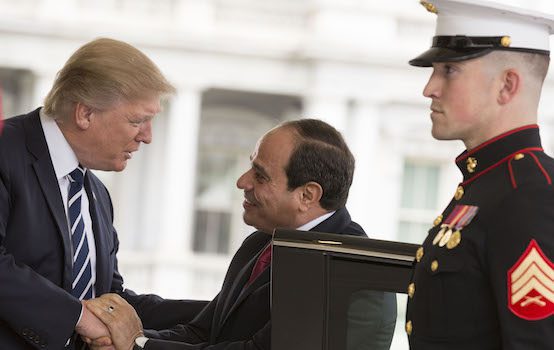Trump’s Disgraceful Libya Policy

AFP reports on the U.S. decision to block a Security Council statement condemning the airstrike committed by Haftar’s forces:
Washington’s move “should not come as a surprise”, said James Dorsey, a researcher at Singapore’s S. Rajaratnam School of International Studies. “It is a sign of US policy changing towards Libya.”
Following more than two hours of deliberations on Wednesday, July 3, the United States blocked the UN Security Council from adopting a unanimous statement condemning the incident.
Bodies were strewn on the floor of a hangar in Tripoli’s Tajoura suburb, mixed with the blood-soaked clothes of migrants following the strike condemned by UN chief Antonio Guterres as “horrendous”. At least 44 people were killed and more than 100 injured.
The US representatives at the UN gave no explanation for the Trump administration’s decision not to condemn the outrage.
When Trump first seemed to throw U.S. support behind Haftar this April, there appeared to be a division within the administration over which side our government was taking in the conflict. The confusion over the U.S. position has proven to be a windfall for competing lobbying groups as Haftar and the Tripoli government vie for favor. The professionals at the State Department and the Pentagon were sticking with the earlier position of backing the internationally recognized government, and Bolton and Trump were going out of their way to encourage Haftar in his bloody offensive on Tripoli. The influence of Egyptian President Sisi and Mohamed bin Zayed, the crown prince of Abu Dhabi, on Trump’s endorsement of Haftar was hard to miss, and subsequent reporting showed that Mohammed bin Salman, the Saudi crown prince, had also lobbied the administration on behalf of the warlord prior to Trump’s phone call with Haftar. The Saudi government was among those that encouraged the attack on Tripoli, so it isn’t surprising that they wanted to get the U.S. on board with their effort to destabilize yet another country.
The striking thing about the administration’s move to block the condemnation of Wednesday’s airstrike is that the statement did not assign blame or condemn Haftar by name, but the U.S. blocked it anyway. Haftar’s forces were pretty clearly responsible for the atrocity, and the U.S. was unwilling to condemn the airstrike even though he was not mentioned in the statement. It seems that the administration understood that Haftar’s forces had committed this war crime and didn’t want any official condemnation of the act from the Security Council. Our government’s representatives at the U.N. offered no explanation because there is none that they could give that wouldn’t sound damning. Unfortunately, my initial assumption that the U.S. was demonstrating its support for Haftar by blocking the statement seems to have been correct.
The AFP report points to the role of UAE-backed lobbying efforts that contributed to this awful result:
“The last two months have witnessed a massive lobbying offensive in Washington with Haftar being represented by his own public relations firm backed by the extensive lobby apparatus of the UAE,” said Andreas Krieg, a lecturer at King’s College London.
“It looks as if the joint Haftar-UAE lobbying of Trump over the past months has been successful in convincing the White House that Haftar’s LNA might be a partner to work with – despite growing evidence of war crimes committed.”
The baleful influence of pro-Saudi and pro-UAE lobbying in Washington has been a major and growing problem for U.S. foreign policy. We know very well how it has poisoned and warped the debate over the war on Yemen, and now we’re seeing how it is doing to same thing to U.S. policy in Libya. Between those lobbying efforts and the president’s subservience to these two governments, U.S. foreign policy in many parts of North Africa and the Middle East is being driven to a large extent by the preferences and ambitions of these despotic client states at the expense of U.S. interests and the stability and security of several other countries.
Comments